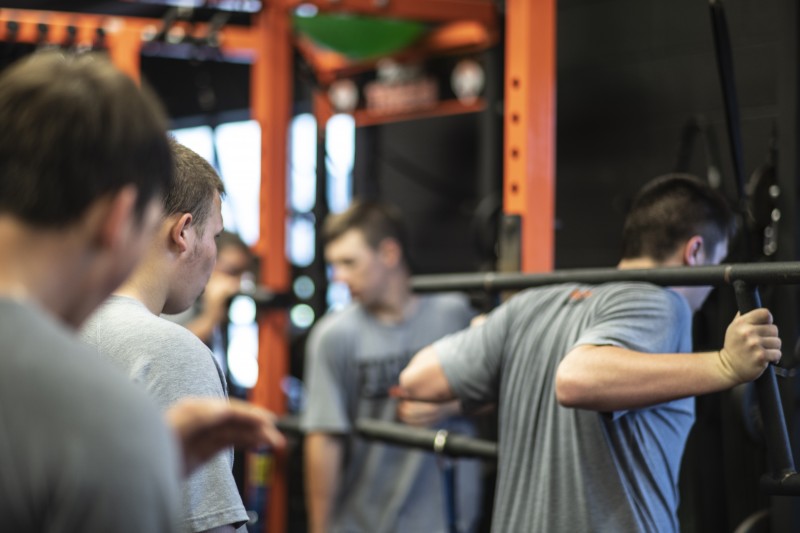

About once a month I return to one of my old articles to assess how I think I'm progressing as a coach, author, and human being. This month, I went back to one titled Rules for Being a Strength Coach. Recently I've been thinking about how much I've changed as a coach and as a person. I can promise you only one thing, and that is that change will occur. If you aren’t willing to change and grow, you won't survive. As Charles Darwin said, “It is not the strongest of the species that survives, nor the most intelligent that survives. It is the one that is most adaptable to change.” I love this quote, even though I recently read that Darwin may not have actually said those words. Honestly, I don’t care if he did or didn’t. The lesson remains the same (as does the song; thanks, Robert Plant). So here are my updated rules for being a strength coach:
1. Stop overthinking and learn from people who have overthought before you.
Brett Bartholomew said this better than I ever will: "Don't overcomplicate training. Lift weights at different loads, at different volumes, at different speeds, in different ways, different times of the year." That is basically what we do. Joe Kenn is a genius because that is basically his book Tier System in one sentence. Find ways to rotate what you do. Variety is the spice of life.
2. Before you worry about reading the newest books and science, read the classics.
Recently, I've noticed that many young strength coaches have never heard of Supertraining or Mel Siff. This is mind-blowing to me. This was the book that started so many great coaches, as well as Science and Practice of Strength Training. If you haven't read these books, put down Brett's book (you should read it as well, though, because it has tons of great information) and read your science. Remember, we're all just standing on the shoulders of giants.
3. Go read Brett Bartholomew and Eric Cressey.
I know — I just told you to put down Brett's hot new strength and conditioning book. What separates these guys is their ability to understand the problems we face more broadly than most of us. A great strength coach must be able to see a problem coming and address it before it arrives. Very few coaches have this ability. I wish I had some of what these guys have. Look at the science of what we do and then go do it. Also, make a lot of mistakes along the way.
4. Load dysfunction.
I know I've said this before, but I won't shut up about it. The reason I think this is important is that no one can tell me what perfect function is and how it should look. My left calf is one inch larger than my right. I know for a fact that this is leading to some dysfunction. This doesn't mean that I can't load my lower limbs. It just means that I must continue to address the issue. Find a way to work with what you have. If you're sitting around waiting for an athlete to move perfectly, you'll never get anyone strong. No matter how well someone moves, strength wins!
5. Use social media, but don’t abuse social media.
Social media isn't good or evil. It's just the world. Whatever you put into it, you’ll get out of it. I love using social media to communicate with friends around the world and keep up with those I don’t see as often as I’d like. For those of you who are old like me, you remember in college getting phone lists of your friends. You would return to school after summer break and try to find all your friends and get their new numbers. Social media has fixed this hurdle. Now how do you use it? If your social media is pictures of you at the Kenny Chesney concert, stop now and get a life. Hey, have some fun and do your thing, but remember that every picture you post is a job interview. Every moment is an opportunity to be noticed for the right reasons or the wrong reasons. Impress me with what you're doing; don’t bore me with your bad decisions.
6. Know how little you know.
In an article I wrote a few years ago, I said that physical therapists need to admit that they aren’t strength coaches. Well, here’s the flip side: you aren’t a physical therapist. I know it's cool to say now that every day is an assessment (and it really is), but you can’t and don’t know how to fix every problem. My university recently hired a new chiropractor. The first time we met, we spoke about a young man who played for us for five years. This young man had all kinds of thoracic mobility issues and, during his time with us, he improved. When the chiropractor saw him, he took our improvements to the next level. The young man hit a 40-inch vertical. Who did it? The chiropractor, the strength coach, or the guy who trained him for his pro day? The answer is none of them. The young man did it. We all just empowered him a little more each and every day. All the experiences he had led to his improvement. So know that you can’t do it all. Let experts in other realms do their jobs and support them.
7. Motivate those around you, but remember that motivation is fleeting.
I love the strength coach grumble. Jim Kiritsy and Matt Balis have the best hoarse voices I've ever heard. I know both of these guys are great coaches and they can be loud and in your face when they need to be. Some people say that yelling isn't coaching. I disagree. We work in a testosterone-driven field and part of your job is to keep people working their hardest. Sometimes that involves being loud. Don't be afraid to motivate through being loud and letting the athlete be loud back. If your training session sounds like a library, ask yourself who gets strong in a library.
8. Train!
This rule will never change. This week we have three different strength coaches visiting and training with us. This will never change! If you visit me, bring your training clothes or I'll loan you some. If you don't train (working out isn't training), get out, please.
9. Learn the proper terminology.
I'm going to sound like a grumpy old man here, but so be it. CrossFit has done some great things. It has put barbells in more women's hands than anything else in the history of training, but it has also taken over ideas that we have done for years. Then people say, "Hey, are you Crossfit?" No, I just train. So let me stand on my soapbox and rant for a second. They aren't rounds; they're sets. Resting a minute is just that; it isn't an EMOM. Failure is called failure, not AMRAP. Just because someone is doing a contrast in their training doesn't mean it’s a WOD. And finally, I'll settle this one — 3x5 is three sets of five reps; 3x5 is not three reps for five sets and it makes no sense to type it that way.
10. Find a mentor and be a mentor.
As I've aged, I've found that many people I've mentored have become my mentors and vice versa. I've had many fine coaches come work for me, and many have come in clueless and left as great coaches. This wasn't because of me as much as it was because they wanted to learn and were willing to push the envelope. The funny part is that almost every time we hated each other at some point. This is normal. When you grow, you’ll start to find your own way and your mentors will see some mistakes. They’ll get mad at you for not listening, but you must learn from your own mistakes.
I've seen so many great young coaches screw up everything and I got mad and frustrated. The problem was that I could see the mistakes but not the lessons. I've learned to be patient and let the young coach do it his or her way. Sometimes it’s important to sit back, watch, and learn.











Now, go do thrusters EMOM for AMRAP as your WOD!
Great article! Loved it!